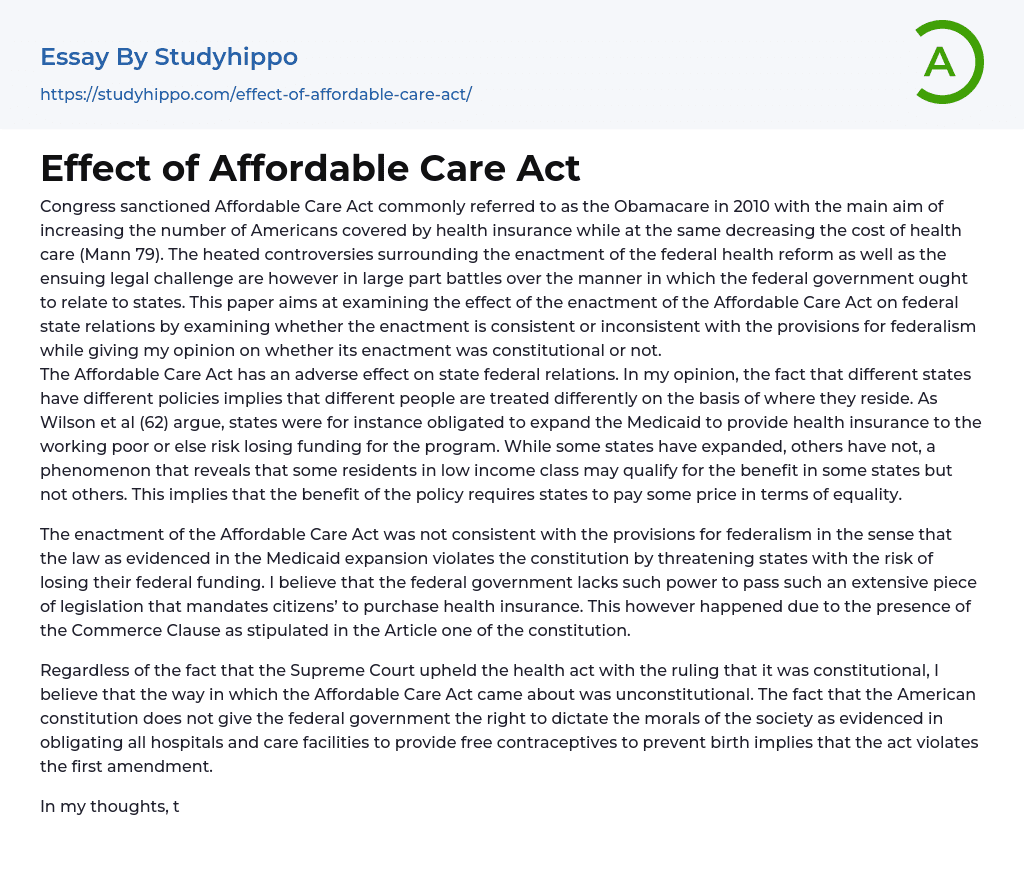The Affordable Care Act, also referred to as Obamacare, was enacted by Congress in 2010 with the aim of improving health insurance coverage for Americans and reducing healthcare costs (Mann 79).
This paper analyzes the impact of the federal health reform and its legal challenge on the relationship between the federal government and states. It investigates how the Affordable Care Act affects federal state relations and evaluates its compliance with federalism provisions. Furthermore, it offers my opinion on the constitutionality of its implementation. The Affordable Care Act has a negative effect on state federal relations by creating disparities in healthcare access for residents of different states. As mentioned by Wilson et al (62), states were compelled to expand Medicaid to ensure health insurance coverage for low-income workers or face potential loss of program funding.
States vary in their approach to Medicaid expansion, resulting in dis
...parities for low-income residents who may be eligible for the program in certain states but not others. This underscores the importance of prioritizing equality across states. The Affordable Care Act's implementation did not adhere to federalism principles and violated the constitution by imposing mandatory Medicaid expansion, jeopardizing states' federal funding. Personally, I question the federal government's authority to enforce such far-reaching legislation that mandates individuals to purchase health insurance. Nonetheless, this situation has arisen due to the Commerce Clause outlined in Article One of the constitution.
Despite the Supreme Court's ruling that deems the Affordable Care Act as constitutional, I believe its implementation contradicts the constitution. This is because it violates the first amendment by requiring hospitals and care facilities to offer contraceptives free of charge. Critics argue that this act oversteps federal authorit
by intervening in private healthcare decisions and compelling states to expand medical coverage (Aguilera 603). Conversely, supporters assert that this act will enhance transparency, competition, and the growth of health providers through universal coverage and health exchanges. Nonetheless, it is probable that the anticipated changes will not produce significant effects as expected (Hough 82).
Work Cited
- Aguilera, Barchet B. A History of Western Public Law: Between Nation and State. , 2015. Print.
- Hough, Douglas E. Irrationality in Health Care: What Behavioral Economics Reveals About What We Do and Why. , 2013. Internet resource.
- Mann, Richard A. Business Law and the Regulation of Business. Place of publication not identified: Cengage Learning, 2016. Print.
- Wilson James Q., DiIulio John J., Jr., Bose Meena,& Levendusky Matthew S. American Government: Institutions and Policies. Cengage Learning, 2016. Print
- Absolutism essays
- Appeal essays
- Bourgeoisie essays
- Contras essays
- Corporate Governance essays
- Corruption essays
- Democracy essays
- Democratic Party essays
- Developed Country essays
- Dictatorship essays
- Elections essays
- European Union essays
- Federalism essays
- Foreign essays
- Foreign policy essays
- Gentrification essays
- Hillary Clinton essays
- Income Tax essays
- International Relations essays
- John Marshall essays
- John Stuart Mill essays
- Left-Wing Politics essays
- Liberty essays
- Military essays
- Monarch essays
- Monarchy essays
- Political Corruption essays
- Political Party essays
- Political Science essays
- President Of The United States essays
- Public Service essays
- Red Cross essays
- Reform essays
- Republic essays
- Revenge essays
- Social Security essays
- Sovereign State essays
- State essays
- Supply essays
- Terrorism essays
- United Nations essays
- World Trade Organization essays




